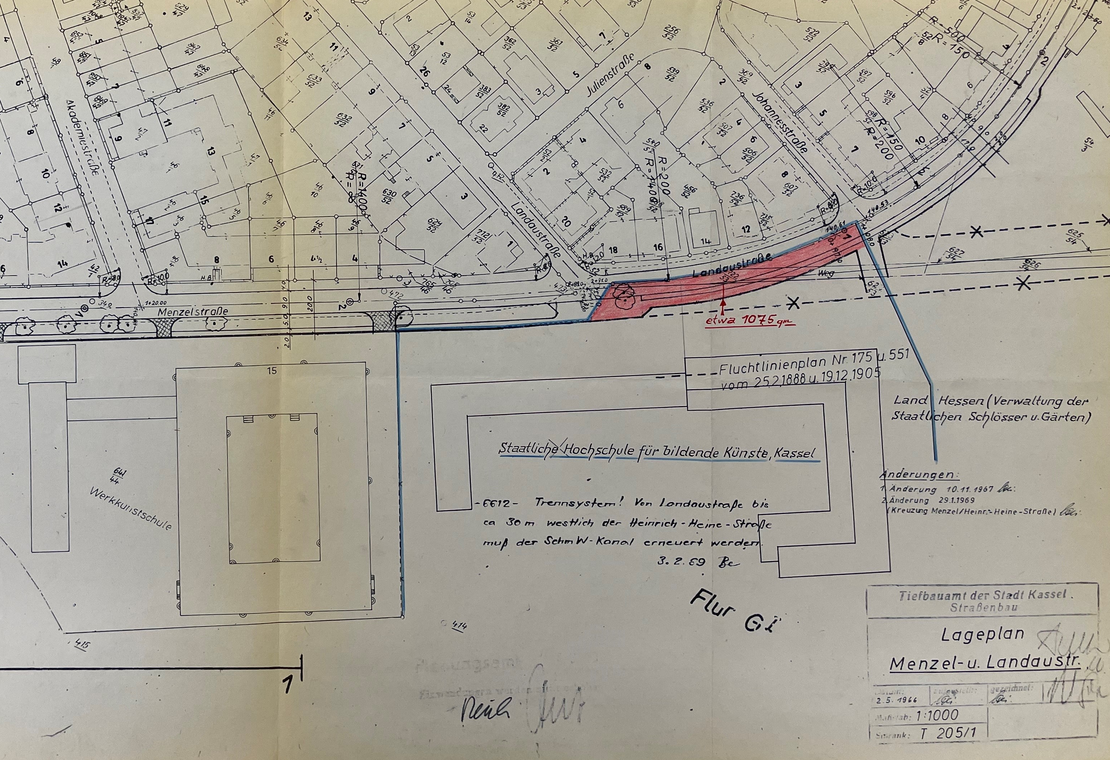This page contains automatically translated content.
Kunsthochschule and documenta: New holdings of the UniArchive provide insight

Why Kassel in particular? The wonder about the location is as old as the documenta itself. Without the network of art education institutions newly founded in Kassel after the Second World War, the establishment of the world art show would be difficult to imagine. From the very beginning, professors from the Werkakademie and the Werkkunstschule had a formative influence on documenta, such as founder Arnold Bode, committee members Stephan Hirzel and Ernst Jupp, and participants Fritz Winter and Harry Kramer.
Both predecessor institutions of the Kunsthochschule stand for a tradition of craftsmanship with reference to the Werkbund and Bauhaus ideas. The "elective affinity" (Heinz Bude) between Bauhaus and documenta, which has been researched in recent years, can be traced back to their spatial proximity and interdependence.
Reopening and integration
In November 1947, Arnold Bode and his artist friends reestablished the Kunstakademie zu Kassel as the Staatliche Werkakademie, which became the Hochschule für Bildende Künste in 1960. With the approval of the American military government, it opened its doors in the winter semester of 1947/48. The School of Arts and Crafts, later known as the Werkkunstschule, began teaching a year earlier. Suitable locations were rare in the destroyed city. The urgent shortage of space was solved in the 1960s with the new buildings by architecture professors Johannes Krahn and Josef Lucas (Südbau and Atrium) and architecture professor Paul Friedrich Posenenske (Nordbau). Today, both are regarded as outstanding examples of post-war architecture, characterized by variability and flexibility. The two institutions were merged in 1970 under the umbrella of the Hochschule für Bildende Künste. One year later, the university was incorporated into the Gesamthochschule Kassel.
Research made easy
With the establishment of the UniArchive in March 2024, the deposit kept in the Hessian State Archive was returned to Kassel and important sources on the creation of documenta in Kassel were obtained. The holdings of the Hochschule für Bildende Künste (formerly the Werkakademie) and the Werkkunstschule include personnel files (the most prominent of which belongs to Arnold Bode), documents relating to the new building in the Karlsaue, correspondence with various institutions and minutes of the specialist committees. Only the historical holdings relating to the Kunstakademie zu Kassel before 1945 remain in Marburg.
Kai Hemken, professor at the School of Art and Design, welcomes the transfer to Kassel. The art historian hopes that the easier access will promote research-oriented teaching with students: "The holdings on the history of the School of Art and Design, which have recently been transferred from Marburg to Kassel, are a valuable foundation for the history of our institution in the 20th century. In the course of research by a project team of art history students, who have dedicated themselves to reconstructing the history of the School of Art and Design with financial support from the University of Kassel, it has become clear that numerous archive trips to Germany, England and the USA are also necessary if the history of the School of Art and Design is to be brought back into the collective memory in its entirety. In this respect, the holdings that have now been made accessible in Kassel also have a cautionary character, as the loss of further documents is the result of the bombing of Kassel in 1943."
With the acquisition of the holdings of the Hochschule für Bildende Künste and the Werkkunstschule by the UniArchiv, the city of Kassel is further expanding its position as a hotspot for documenta research. In Kassel, its history can now be researched together with other relevant sources on the origins and development of documenta in the city archive and in particular in the documenta archiv. All these archive materials can be researched via the Arcinsys archive platform. They can be viewed by appointment in the reading room of the university archive.